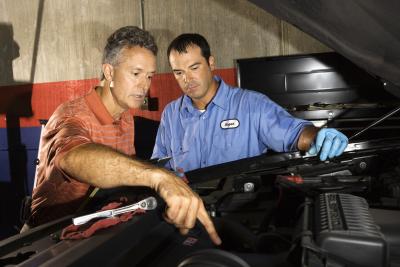
People buy vehicles with salvage titles to save money or to make money. If you have the mechanical skills to repair a salvage vehicle, you can purchase it, do the work yourself and drive a vehicle that costs you a fraction of the regular market price, or you can sell it and earn a profit. However, even if you don’t know the difference between a socket wrench and a screwdriver, you’ll still save money by buying a repaired salvage vehicle. There’s some uncertainty with a salvage title, but the savings may be worth the risks.
If you’re buying a salvage car with the intention of fixing it yourself and then reselling it, inspect the car carefully and do some research. Get a clear idea of:
Each state has its own regulations regarding the reselling of vehicles and the type of title it issues to a repaired vehicle. For instance, in Utah, a person with a business license and tax ID number may purchase, repair and resell up to five vehicles per year without a salvage vehicle buyer's license. Once the vehicle is repaired, the seller must provide the buyer with a specifically worded disclosure. The branded title will state “Repaired/Restored” unless the vehicle only needed repair to one or two major components. Become familiar with your state’s laws before buying a car with a salvage title.
You can save money by purchasing a salvage car that’s been repaired, but it does involve risk. Do your research and carefully screen the seller to ensure that you’re getting honest information and paying a fair price for the vehicle.
The seller should be willing to show you:
Take the car to your mechanic for a thorough inspection and to ensure that the seller purchased quality replacement parts and performed repair work properly . Take the same precautions when buying a repaired salvage vehicle as you would when buying any used car.
Lenders typically don’t offer traditional financing for vehicles with salvage or repair titles due to the low resale value. Be prepared to pay cash for your vehicle, or finance it using other means, such as a personal loan. Many insurance companies do not offer comprehensive coverage on repaired salvage cars. Talk to your insurance agent before buying a salvage car to find out what, if any, coverage is available. You may be able to purchase liability insurance for the vehicle, but be prepared to pay your own repair costs out of pocket if you get in an accident.
The difficulties of financing and insuring a car with a branded title, combined with the risks associated with a salvage car, keeps the pool of prospective buyers small. If you’re forced to sell the car quickly, you may have to discount it deeply -- even more than its already reduced value. If you purchased the car at auction and repaired it yourself, you should have a large enough margin to make a profit. However, if you’re purchasing a repaired salvage vehicle, your vehicle’s resale value is much lower than that of an undamaged vehicle of the same make and model.